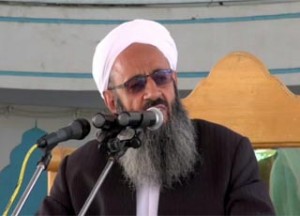Shaikh Abdol-Hamid alluded to extension of insecurity and problems in the Muslim world urging on rights of all classes of nations to get rid of crises. He was talking to Sunni worshippers in Zahedan on Friday, 4 April, 2015.
Khateeb of Sunnis expressed his concerns on possible chaos and more conflicts in other parts of the Muslim world. He said, “Many of the ongoing crises in the Muslim world can be resolved by dialogue and negotiation. Most of the conflicts and insecurities have changed into sectarian and religious conflicts.”
“The current situation and affairs need to be changed. There must be a change in policies. Acting on my responsibility, I had asked the Muslim leaders and rulers to review their policies before this.”
Mawlana Abdol-Hamid pointed out to the reasons behind the challenges of the Muslim world and said, “I have talked in some conferences in Tehran and Qom recently; in my viewpoint, the root cause of crises and challenges in the Muslim world is in neglecting the facts. Elite and veteran politicians, the UN and different states do not see the facts of the world.”
“It is the main problem that mostly a particular group wants to restrict the power in its hands without participation of others. In many countries, rights of minorities are neglected and monopolist groups marginalize others. In elections minorities do not get their due rights and in many states election is just a dramatic show.”
“When deprived parties and groups see their rights wasted, they do not submit before the ruling parties and then we see revolutions and conflicts kick off. They create problems then. Thus governments must not be heritable or restricted to any particular community and sect. minorities whether they are Sunnis or Shias must have their due rights.”
Opposing military intervention and urging on negotiation to resolve the ongoing crises, he underlined, “We have experienced a serious issue like the nuclear case of Iran was resolved by negotiation. We think this issue has been resolved as the two sides agreed upon the necessity of dialogue. Sanctions and military assault cannot resolve crises.”
“Negotiation can bring peace in Yemen, Libya, Syria and Iraq too. It is in accordance with the interests of all states to pay attention to the rights of their minorities and all classes of nation,” the outstanding Iranian Sunni leader concluded his points.
Making the province insecure isn’t acceptable
In another part of his speech, Shaikh Abdol-Hamid decried murder of 8 Iranian border guards and 2 personnel of the Revolutionary Guards in Sistan-Baluchistan and said, “We, Ulama, educated class and tribal elders do not allow anyone to create security problems in Sistan-Baluchistan. We want our rights under peace and security.”
“We do not claim the Iranian Sunnis have no problem and they have got their due rights. There are many problems, but we believe in peaceful channels like dialogue.”
Khateeb of Sunnis termed the overall situation of the province ‘good’ and said, “There have been some good and hopeful changes in the province. Most of the governors in southern Baluchistan are Sunnis; the Shia ones are in fact just men too. There are many developing projects under construction and the government is going to decrease the rate of unemployment.”
Marginalizing Sunnis, the biggest problem in Iran for them
The prominent Islamic scholar asked president Rouhani to pay more attention to all Sunni-populated regions getting them engaged in power and management of the country.
He said, “We want to take part in development and management of our country in all levels. We expect the politicians to observe our acts and affairs; security and spy agencies must not observe our works who are so young for this duty.”
“There are some obstacles and problems but we show patience. Meanwhile it is disappointingly shocking to hear some security personnel stop Sunni worshippers to gather for prayers in a metropolis. We hope the authorities permit us to offer prayers and worship the Almighty according to our jurisprudence without any hesitation as Jews and Christians are free in their worships,” he underlined.
At the end of his speech, Mawlana Abdol-Hamid said, “We can play positive role in international levels to resolve some crises; unfortunately we have not been allowed to do so.”












Comments